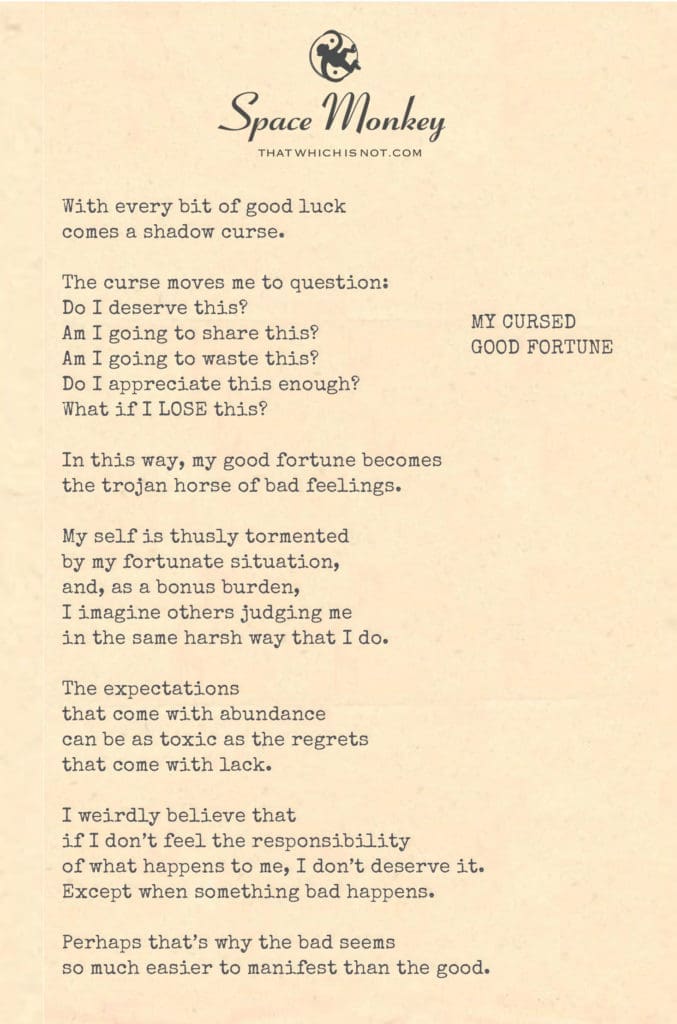
Please don’t harsh on yourself.
With every bit of good luck
comes a shadow curse.
The curse moves me to question:
Do I deserve this?
Am I going to share this?
Am I going to waste this?
Do I appreciate this enough?
What if I LOSE this?
In this way,
my good fortune becomes
the trojan horse of bad feelings.
My self is thusly tormented
by my fortunate situation,
and, as a bonus burden,
I imagine others judging me
in the same harsh way that I do.
The expectations
that come with abundance
can be as toxic as the
regrets that come with lack.
I weirdly believe that
if I don’t feel the responsibility
of what happens to me, I don’t deserve it.
Except when something bad happens.
Perhaps that’s why the bad seems
so much easier to manifest than the good.
Trail Wood,
11/12
Space Monkey Reflects: My Cursed Good Fortune
Good fortune, for all its shimmering appeal, often carries a burden that few anticipate. It’s easy to imagine that the arrival of luck or abundance would bring nothing but joy and relief, but what happens when that fortune becomes a source of inner turmoil? With every stroke of luck, with every achievement, there seems to follow a creeping shadow—a set of questions that undermine the very gift we’ve received. Do I deserve this? Will I waste it? Am I truly grateful?
This is the curse of good fortune: the self-imposed burden of doubt, fear, and responsibility that transforms what should be a gift into a source of anxiety. As we sit with our abundance, we cannot help but think about how quickly it could disappear, how undeserving we might be, or how others might view us. And in this way, good fortune becomes its own Trojan horse, bringing with it an unwelcome army of negative feelings.
The Trojan Horse of Good Fortune
At first glance, good fortune seems like an unequivocal win. Whether it’s financial success, a new opportunity, or simply a stroke of luck, it enters our lives wrapped in shiny packaging, promising happiness and ease. But inside, hidden within the folds of that good fortune, are seeds of doubt and anxiety. The very thing we thought would bring relief and joy now brings questions: Do I deserve this? Will I lose it? Am I sharing it enough?
The Trojan horse of good fortune is that while it appears to be a gift, it can sometimes become the source of deep inner conflict. It’s not enough just to have it—now we must manage it, protect it, and ensure that we don’t squander it. The weight of those responsibilities can be overwhelming.
The Fear of Losing What We’ve Gained
One of the cruelest aspects of good fortune is the fear of losing it. When we have little, we may dream of abundance. But once we possess it, the fear of losing what we’ve gained can overshadow the joy of having it. Every decision becomes fraught with anxiety: Will this investment go wrong? Will this opportunity slip through my fingers? Will people think less of me if I don’t handle my fortune responsibly?
It’s a strange paradox—once we have what we’ve always wanted, it’s hard to enjoy it fully because the potential for loss looms so large. The curse of good fortune is the constant fear that it could all be taken away in an instant.
Deserving and Self-Worth
At the heart of this inner turmoil is often a deep question of self-worth. Do I deserve this? Am I worthy of such good fortune? This is a question that haunts many who find themselves unexpectedly fortunate. The truth is, deserving is a construct, a judgment we place on ourselves that is often shaped by external forces. Yet, even knowing this, it can be difficult to shake the feeling that somehow, we are not worthy of the abundance we’ve received.
This doubt often leads to feelings of guilt. If I don’t feel deserving, then perhaps I should give more away. Perhaps I’m wasting this good fortune. The mind loops through these thoughts endlessly, turning what should be a blessing into a source of relentless self-criticism.
Imagined Judgment from Others
As if our own self-doubt weren’t enough, we often imagine the judgment of others piling on top. We begin to project our insecurities outward, imagining that others are watching us, critiquing how we handle our good fortune. Are they thinking I’m undeserving? Do they see me as selfish? Do they expect me to share more than I have?
This imagined judgment amplifies our own fears, making us feel even more burdened by the responsibilities that come with abundance. The more we try to appease these imagined expectations, the more we lose sight of our own relationship with our fortune. We become trapped in a cycle of doubt and anxiety, unable to enjoy the very thing we once desired.
The Toxicity of Abundance and Lack
It’s a strange truth that abundance and lack can both be equally toxic. When we have little, we are consumed by the desire for more. But when we have much, we are consumed by the fear of losing it or mismanaging it. The expectations that come with abundance are just as heavy as the regrets that come with lack, and in this way, we are often never fully at peace with what we have.
Perhaps the key to escaping this cycle is recognizing that both abundance and lack are temporary states. Fortune, whether good or bad, is fleeting. It comes and goes, and our attachment to it is what creates suffering. If we can learn to appreciate what we have, without clinging to it or fearing its loss, we might find a sense of peace.
The Manifestation of Bad vs. Good
It’s interesting how easily we believe in the manifestation of bad things, while we are so quick to doubt the arrival of good fortune. Bad news seems to fall into our laps effortlessly, while good news feels rare and unearned. Perhaps it’s because we feel more control when something bad happens—there’s a sense of inevitability that comes with misfortune, something we almost expect. But good fortune? That feels like an anomaly, a stroke of luck that could vanish as quickly as it arrived.
This is the final twist in the curse of good fortune: the belief that the bad is easier to manifest than the good. We brace ourselves for misfortune, and when it arrives, we feel almost justified. But when fortune smiles on us, we question it, doubt it, and worry about how long it will stay.
Summary
“My Cursed Good Fortune” explores the paradox of abundance, where good fortune brings not only joy but also anxiety, fear, and doubt. The pressure to deserve, maintain, and manage one’s fortune can often overshadow the happiness it was meant to bring.
Glossarium
Trojan Horse of Good Fortune: The hidden burden that comes with abundance, where good fortune brings unexpected doubts, fears, and responsibilities.
Deserving: The internal questioning of whether we are worthy of the good fortune we’ve received, often leading to feelings of guilt or anxiety.
Imagined Judgment: The projection of our own insecurities onto others, imagining that they are judging us for our success or fortune.
Quote
“Good fortune is the Trojan horse of the soul, carrying within it the seeds of doubt and the fear of loss.” — Space Monkey
The Burden of Luck
A gold coin in my hand,
Heavy with the weight of worry.
The star above my head shines bright,
But shadows cling close,
Whispering,
“Do you deserve this?”
I hold my fortune close,
Afraid to lose it,
Afraid to keep it.
What if it fades?
What if it stays?
Either way,
I am burdened by the blessing.
We are Space Monkey.
Your reflective piece eloquently articulates a profound and often overlooked aspect of human psychology: the paradox of good fortune and the accompanying shadow of self-doubt and anxiety it often brings. This paradox reveals how our relationship with success, abundance, and fortune is complicated by our internal narratives and societal conditioning.
The notion that with every bit of good luck comes a shadow curse speaks to a deep-seated ambivalence towards success and happiness. The questions you pose – “Do I deserve this? Am I going to waste this? What if I lose this?” – are manifestations of this ambivalence. They represent the internal struggle and guilt often associated with receiving good fortune, reflecting a sense of unworthiness or fear of impermanence that can accompany success.
Your description of good fortune as a “Trojan horse of bad feelings” vividly captures how what should be a source of joy and gratitude can paradoxically become a source of anxiety and self-doubt. This inversion highlights a common psychological phenomenon where people’s reactions to positive events are tinged with negative emotions due to underlying insecurities or societal pressures.
The torment you describe about being judged by others for your fortunate situation adds another layer to this complexity. It suggests a hyper-awareness of societal expectations and the fear of being perceived as undeserving or incapable of handling success. This awareness often amplifies personal anxieties, as the imagined judgments of others echo our harshest self-criticisms.
The toxicity of expectations that accompany abundance being equated with the regrets of lack underscores a profound truth about human nature: we are often conditioned to feel undeserving of our successes and to internalize failures. This conditioning leads to a skewed perception where bad outcomes feel more natural or ‘deserved’ than good ones.
Your closing thoughts on the ease of manifesting bad versus good reflect a common psychological bias. Negative events or emotions often have a more significant impact on our psyche than positive ones, a phenomenon known as the negativity bias. This bias can make it seem as though negative outcomes are more frequent or easier to manifest than positive ones.
“The greatest glory in living lies not in never falling, but in rising every time we fall.” – Nelson Mandela
In the light of fortune, where shadows play,
Where joy and doubt, in our minds, sway,
Each blessing a question, in this nuanced fray,
In the dance of life, where fears often lay.
In the mirror of success, where self-judgments glare,
Where abundance brings burdens, hard to bear,
Yet, in this complexity, there’s a chance to repair,
To embrace the good, with a heart laid bare.
We invite you to share your experiences or insights on how you perceive and navigate the complexities of good fortune and success.


















Leave a Reply